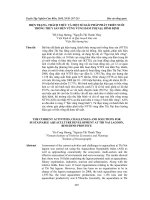leisure activities, festivals and holidays
Bạn đang xem bản rút gọn của tài liệu. Xem và tải ngay bản đầy đủ của tài liệu tại đây (988.58 KB, 36 trang )
HCMC COLLEGE OF
ECONOMICS
Subject: British studies
Teacher: Ms.Minh
Student: Tran Thi Minh Hanh
Topic: leisure activities, festivals and
holidays
I) Leisure activities
What do British people like doing at the
weekend?
The weekend are time for families in
Britain
Saturday is a busy time for shops with
many families going shopping
Sunday is a very special day of the week in Britain
Popular leisure activities on
Sunday are going to church
And doing jobs around the
home such as gardening
and DIY
How do people spend their free time?
1) Indoor activities:
The most common leisure activity in the UK is
watching television
The average viewing time is 25 hours per person per
week
Radio:
People in Britain listen to an average 15
hours and 50 minutes of radio each week
Digital Devices:
In January to April 2006, 56 percent of
household in Great Britain had a desktop
computer, 30 percent had a portable or
laptop computer, and 7 percent had a
handheld computer
2) Outdoor activities:
A) Visiting or entertaining friends or relations
Mum & Dad go out and visit
friends at least once a week.
Sometime me and my brother
go too
B) Cinema ( Movie house):
Britons made 123 million visits to the cinema in 1998
making it the most popular cultural activity in the UK
C) Eating out:
British people spending in 1999 an average of 5.63
dollar per person per week on food (excluding
alcohol)
We go to McDonalds at
least once a week.
Sometime we have
pizza delivered to our
home. Occasionally we
will go to a restaurant
D) Sports and physical recreation:
Local governments provide cheap sport and leisure
facilities such as swimming pools, tennis courts,
parks and gold courses
People go to watch other people play sports like
football or take part in sports themselves.
II) Holidays:
1) Traditional holidays:
The traditional British holiday is a seaside holiday
Children used to watch a Punch
and Judy show (puppets)
And ride donkeys
along a beach
2) Holidays abroad:
Europe is the most popular destination for UK
residents, accounting for 80 per cent of visits
abroad. Spain has been the most popular country
to visit since 1994, with 13.8 million visits in 2005.
France was second in popularity, with 11.1 million
visits.
III) Festivals:
January
New Year (1st)
Bank Holiday
Twefth night (5th)
Plough Monday
February
Candlemas Day
(1st)
St Valentines Day
(14th)
March
St David's Day
(1st) (Wales)
St Patrick's Day
(17th) (Ireland)
April
April Fool's Day
(1st)
St George's Da
y
(23rd)
(England)
Special Days that
move each year
(February/March/A
pril)
Shrove Tuesday
(Pancake Day)
Lent
Mothering Sunday
(UK Mothers Day)
Easter
May
May Day
(1st)
Rochester Swee
ps Festival
Two
Bank Holidays
Whistun
June
Trooping of the
Colour
Fathers' Day
Wimbledon
Tennis
Championship
July
August
Edinburgh
Festival
Notting Hill
Carnival
Bank Holiday
September
Harvest
Festival
October
Halloween
(31st)
November
Bonfire Night
(5th)
Remembrance
Day
(11th)
St Andrew's D
ay
(30th)
Advent
December
Advent
Christmas (25th)
Boxing Day (26th)
1)Bank holidays
British bank holidays are public holidays
and have been recognised since 1871.
Bank holidays are public holidays in the
United Kingdom, when banks and many
other businesses are closed for the day.
The expected dates of bank and public holidays in England, Wales
, Scotland and Northern Ireland are shown below:
England and Wales Scotland Northern Ireland
New Year's Day New Year's Day New Year's Day
Easter Monday 2nd January Easter Monday
Early May Bank
Holiday
(First Monday in May)
Early May Bank Holida
y
(First Monday in May)
Early May Bank
Holiday
Spring Bank Holiday
(Last Monday in May)
Spring Bank Holiday
(Last Monday in May
Spring Bank Holiday
Summer Bank Holiday
(Last Monday in August)
Summer Bank Holiday
(FIRST Monday in
August)
Summer Bank Holiday
Boxing Day Boxing Day Boxing Day
St Andrew's Day
30 November or the next
Monday if a weekend
St Patrick's Day
2)Shrove Tuesday:
In the UK, Shrove Tuesday is also known as
Pancake Day (or Pancake Tuesday to some
people) because it is the one day of the year
when almost everyone eats a pancake
In 2010 Pancake Day is on Tuesday 16
February
Pancakes are eaten on this day because
they contain fat, butter and eggs which
were forbidden during Lent
3) St. David's Day (The National Day of
Wales )
St David's Day is celebrated in Wales on 1
March, in honour of St David (Dewi Sant),
the patron saint of Wales.
This is the flag of St David. It is not the flag of Wales
.
The national emblems of Wales are daffodils
and leeks
On St David's Day, some children
in Wales dress
in their national costume,
which consists of a tall black hat,
white frilled cap and long dress.
The national flag of Wales,
depicting a fiery red dragon
(Y Ddraig Goch)
against a green and white
background, is also flown.
4) St. Patrick's Day (The National Day of
Northern Ireland and Republic of Ireland )
St. Patrick's Day is celebrated in the whole of Ireland on 17 March,
in honour of St Patrick, the patron saint of Ireland.
This is the flag of St Patrick







